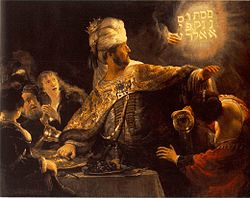 Fauré’s Requiem and Walton’s Balshazzar’s Feast are strikingly different pieces, and I have to admit that I was sceptical about how well they would work together in a concert. Fauré bathes us in a gentle vision of heavenly glory; Walton plunges us headlong into earthly decadence. The two pieces place very different demands on the choir too, with the Fauré needing quiet, controlled singing with every detail exposed, whereas the Walton demands energy and panache.
Fauré’s Requiem and Walton’s Balshazzar’s Feast are strikingly different pieces, and I have to admit that I was sceptical about how well they would work together in a concert. Fauré bathes us in a gentle vision of heavenly glory; Walton plunges us headlong into earthly decadence. The two pieces place very different demands on the choir too, with the Fauré needing quiet, controlled singing with every detail exposed, whereas the Walton demands energy and panache.
In her last concert as assistant conductor of Durham Choral Society, Clare Lawrence-Wills’s gave thoughtful direction to Fauré, characterised by long lines and beautifully shaped phrasing, particularly in the Kyrie and in the long unfurling O Domine. The opening Requiem Aeternam came across as an intense plea, one that was then answered with added conviction when the same music returns in the Agnus Dei.
The prevailing mood of Fauré’s Requiem is serenity, with little touches of darkness or fear that are swiftly quelled. Clare Lawrence-Wills and the singers and orchestra of Durham Choral Society handled these moments beautifully, with good dynamic contrasts and they held back their loudest singing and playing for just the most important moments. The low strings gave the Libera Me a sinister underpinning and the sudden blaze of the brass entry still came as a surprise, even though I know the piece really well.
The Pie Jesu, set for solo soprano, is one of the best-loved movements of Fauré’s requiem, but one of those pieces of music that is dangerously over-familiar and to be honest, if it comes on the radio, I’m not likely to pay it much attention. There was no danger of that this evening though when it was being sung by soprano Rowan Pierce, giving it a cool and fresh new lustre. A hint of choirboy purity added a silver edge to her strong voice, which carried perfectly right to where I was sitting in the back of the cathedral nave, pouring out in an unbroken legato right through to the magic of her last sustained note.
Any ideas of heaven that lingered after the In Paradisum were immediately shattered by the opening of Walton’s Belshazzar’s Feast after the interval. The brass section, now well and truly off the leash after their tasteful good behaviour in the Fauré, launched a dramatic performance with their first fanfare. The orchestra were on excellent form throughout Belshazzar; brilliantly evoking all the unashamed debauchery and paganism of the Babylonian court. Conductor Mike Summers gave plenty of space for all of Walton’s colour and detail to come through – not an easy job in Durham Cathedral, which has so many failings as a concert venue, and although at times the overall sound had turned into a mush by the time it reached the back, the driving pulse of Walton’s music was never lost.
Baritone soloist Andrew Slater also did a great job in overcoming both the acoustic limitations of the cathedral, and the terrifying nakedness of Walton’s recitatives. These baritone narratives are totally unaccompanied, and come from absolute silence: Andrew Slater grabbed them fearlessly, filling the building with authoritative, characterful singing.
The choir too committed themselves to the dramatic details of the story, and their unaccompanied passages where they didn’t have to do battle with the orchestra came across particularly well. I enjoyed the punchy accents on the word ‘wept’, and the really strong sense of indignation when they sang about the Babylonians defiling their sacred vessels. The passage immediately before Belshazzar’s death, in which the choir offer an invocation to his eternal life was laden with doom and irony, and then as the choir switches character to become the Jews celebrating Belshazzar’s downfall, the ecstasy was tinged with something dangerous, the wild dance of joy and reckless trumpets threatening to tip over into violence.
The other side of the story at this point is supplied by Northern Spirit Singers singing the semi-chorus part. The waves of celebration part for a few poignant moments to let us glimpse the Babylonians as they mourn the silenced trumpets and harps, and the extinguished candles. It’s a beautiful moment in Walton’s frenzied score, and Northern Spirit Singers brought out all the human anguish behind the destruction. It was this lovely moment that gave the concert coherence, linking Walton and Fauré in their deep understanding of humanity.





